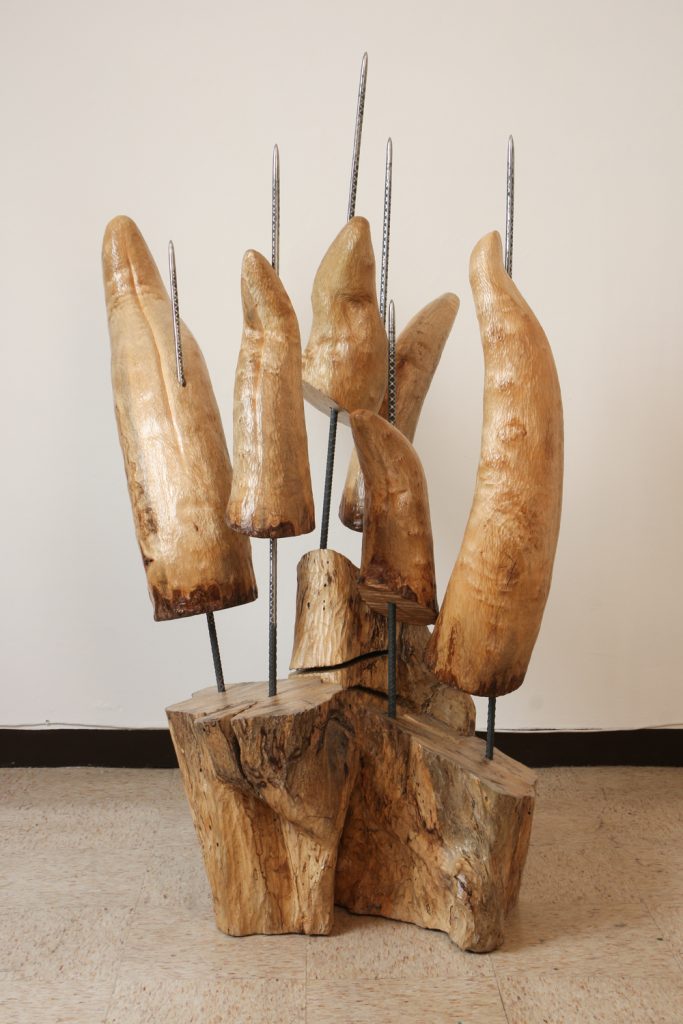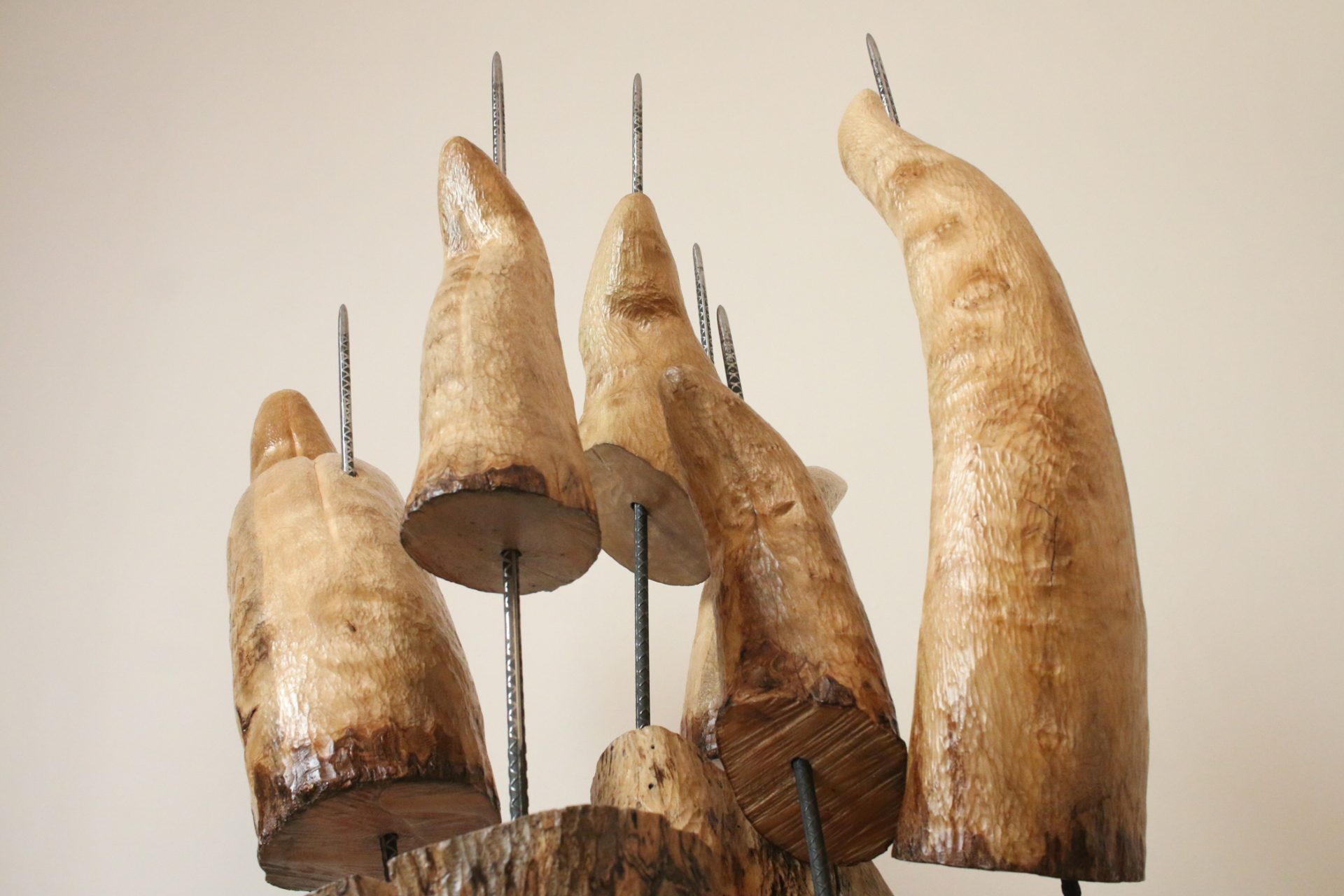
(English below)
No tenemos armas, 2024
Escultura de madera y varilla. Altura de 155 centímetros y circunferencia de 105 centímetros.
Archivo para intervenr espacio.
No tenemos armas para presionarles es una frase proveniente de un archivo conformado por 40 intervenciones hechas en su mayoría por organizaciones no gubernamentales y comunidades afectadas durante conferencias mundiales sobre el medio ambiente. Durante éstas exigieron el derecho a proclamar su dignidad, evidenciaron culpables en cuestiones medio ambientales y señalaron la urgencia de tomar acciones directas. Este archivo revisa 50 años de absurda confianza en organismos mundiales como medio para llegar a la justicia social y ambiental. Por otro lado, estructura cómo han evolucionado las iniciativas para respaldar a lxs defensorxs ambientales frente a los asesinatos que ocurren en Latinoamérica donde México, Brasil y Colombia presentan el mayor número de siniestros.
Este archivo está acompañado por una escultura de madera y varilla. Un tronco mutado en seis extremidades-lenguas cortadas y empaladas da cuenta de la persecución que existe contra las comunidades que se organizan tratando de contrarrestar el sistema de muerte sobre la naturleza. No tenemos armas desarchiva voces desde la tierra para configurar un repertorio de luchas y cinismo vigentes. Este registro advierte sobre la contaminación de la mente humana, la urbanización y las diferencias culturales, temas vitales para el devenir social y ambiental.
No tenemos armas parte de la creación del Acuerdo de Escazú, el cual se caracteriza por abordar el acceso a la justicia ambiental en América Latina y El Caribe. Abarca del año 1970 al año 2021, año en el que el Acuerdo de Escazú es ratificado y entra en vigor. A partir de éste, se examinan las primeras conferencias del “medio humano” de forma global. Mas adelante se cambia el nombre a “medio ambiente”, se focalizan los puntos de mayor urgencia a tratar y se plantean perspectivas Norte-Sur.
Como en todo tratado internacional, se mantiene la emisión de recomendaciones como límite, sin acciones directas o sanciones legales para dar paso a la justicia ambiental. Los discursos hechos por altos representantes, así como por personas jóvenes y organizaciones no gubernamentales cumplen su ciclo y se repiten pasadas las generaciones. El remanente de las enunciaciones queda en un documento escrito y en el aplauso estéril. Este archivo evidencia la mitigación de organizaciones comunitarias en Latinoamérica, el beneficio histórico del Norte sobre el Sur y la colusión del narcoestado con empresas multinacionales caracterizadas por la extracción de recursos naturales.
Archivo
(Cada oración contiene un hipervínculo, da click en cada oración para conocer su contexto.)
El peor crimen es la muerte de la esperanza
Nunca se insistirá la suficiente
¿Se trata de un sueño o es algo que no podemos evitar?
Contaminación de la mente humana
Competición por una parcela de terreno
Lento proceso de agotamiento y desmedro
Las grandes ciudades son medios ambientes artificiales
Se creía que el cielo es tan inmenso y claro que nada podría cambiar su color
No tenemos armas para presionarles
Hablan muy poco de vivir y en cambio demasiado de sobrevivir
Durante cuánto tiempo podemos seguir pretendiendo
Ruidos y vibraciones sobre la salud y las condiciones de vida
Los océanos proporcionan el equilibrio
Un elemento injustificado de urgencia dramática
Política de pillaje, agresión y guerra
Actuar sin amenazas, restricciones e inseguridad
Se apresuran a registrar sus derechos de propiedad
Repercusión final sobre las poblaciones humanas
Al precio de tensión ecológica
Cultura del privilegio profundamente arraigada
Bibliografía del archivo
1972 INFORME DE LA CONFERENCIA DE LAS NACIONES UNIDAS SOBRE EL MEDIO HUMANO
1980 NOTAS SOBRE LAS RELACIONES NORTE-SUR Y EL INFORME BRANDT
1982 CARTA MUNDIAL DE LA NATURALEZA
1987 DESARROLLO Y COOPERACIÓN ECONÓMICA INTERNACIONAL: MEDIO AMBIENTE
1992 DECLARACIÓN DE RÍO SOBRE EL MEDIO AMBIENTE Y DESARROLLO
2012 RÍO+20 CONFERENCIA DE LAS NACIONES UNIDAS SOBRE EL DESARROLLO SOSTENIBLE
2015 TRANSFORMAR NUESTRO MUNDO: LA AGENDA 2030 PARA EL DESARROLLO SOSTENIBLE
___
We have no weapons, 2024
Sculpture made of wood and rod. Height: 155 centimeters, circumference: 105 centimeters.
Archive to intervene in exhibition space.
“We have no weapons to pressure them” is a phrase from an archive that comprises 40 interventions, mostly by non-governmental organizations and affected communities at global environmental conferences. During these events, they demanded the right to proclaim their dignity, identified culprits in environmental issues, and underscored the urgency of taking direct action. This archive reviews 50 years of misplaced trust in global organizations as a means to achieve social and environmental justice. On the other hand, it examines how initiatives to support environmental defenders have evolved in response to the assassinations occurring in Latin America, where Mexico, Brazil, and Colombia register the highest numbers of such incidents.
In addition to the archive, this work is accompanied by a sculpture made of wood and rebar. A tree trunk mutated into six severed and impaled tongue-limbs bears witness to the persecution faced by communities that organize to resist the death-driven system imposed on nature. We have no weapons unarchives voices from the earth to assemble a repertoire of ongoing struggles and cynicism. This record warns about the contamination of the human mind, urbanization, and cultural differences, all of which are critical to social and
environmental futures.
We have no weapons starts with the creation of the Escazú Agreement, which is characterized by addressing access to environmental justice in Latin America and the Caribbean. From 1970 to 2021, the year the Escazú Agreement was ratified, this archive takes shape. It examines the first global conferences on the “human medium.” Later on, the term shifts to “environment,” urgent issues are prioritized, and North-South perspectives are outlined.
As with every international treaty, recommendations continue to be issued as the limit, without direct actions or legal sanctions to make way for environmental justice. Speeches by high-ranking representatives, as well as by young people and non-governmental organizations, follow their cycle and are repeated across generations. What remains of these statements is a written document and sterile applause. This archive reveals the mitigation efforts of community organizations in Latin America, the historical benefit of the North over the South, and the collusion of narco-states with multinational companies known for the extraction of natural resources.




